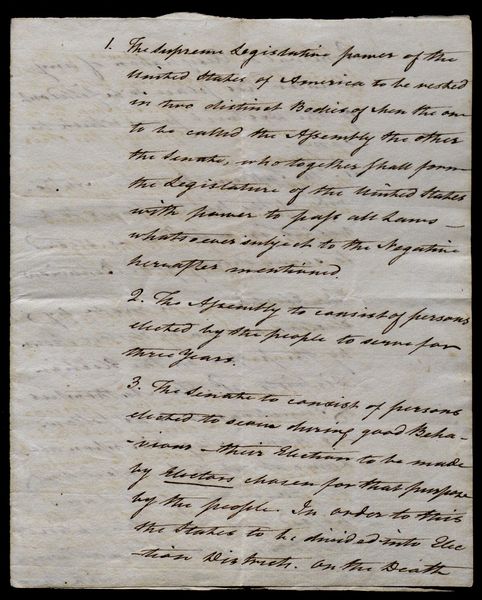Lansing, John (1754-1829) The Supreme Legislative power of the United States of America...
High-resolution images are available to schools and libraries via subscription to American History, 1493-1943. Check to see if your school or library already has a subscription. Or click here for more information. You may also order a pdf of the image from us here.
A high-resolution version of this object is available for registered users. LOG IN
Gilder Lehrman Collection #: GLC00819.10 Author/Creator: Lansing, John (1754-1829) Place Written: Philadelphia, Pennsylvania Type: Manuscript document Date: 18 June 1787 Pagination: 6 p. ; 20 x 16 cm. Order a Copy
Hamilton's constitutional plan for two legislative bodies, as Assembly and Senate, and a permanently elected executive. In the hand of John Lansing, Jr.
1. The Supreme Legislative Power of the United States of America to be vested in two distinct Bodies of Men the one to be called the Assembly the other the Senate, who together shall form the Legislature of the United States with power to pass all Laws whatsoever subject to the Negative hereafter mentioned.
2. The Assembly to consist of persons elected by the people to serve for three Years.
3. The Senate to consist of persons elected to serve during good Behaviour--their Election to be made by Electors chosen for that purpose by the people. In order to this the States to be divided into Election districts. On the Death [2] Removal or Resignation of any Senator his place to be filled out of the District from which he came.
4. The Supreme Executive Authority of the United States to be vested in a Govr. to be elected to serve during good Behaviour. The Election to be made by Electors chosen by Electors chosen by the people in the Election Districts afd. The Authorities & Functions to be as follows--to have a Negative upon all Laws about to be passed and the Execution of all Laws passed--to have the entire Direction of War when authorized or begun--to have with the [3] Advice & Approbation of the Senate the power of making all Treaties--to have the sole Appointment of the Heads or chief Officers of the Departments of Finance, War & Foreign Affairs--to have the Nomination of all other officers (ambassadors to foreign Nations included) subject to the Approbation or Rejection of the Senate--to have the power of pardoning all offences except Treason which he shall not pardon without the Approbation of the Senate.
5. On the Death Resignation or Removal of the Govr. his Authorities to be exercised by the President of the Senate till a successor be appointed. [4]
6. The Senate to have the sole power of declaring War--the power of advising and approving all Treaties--the power of approving or rejecting all Appointments of Officers except the Heads or Chiefs of the Departments of Finance and Foreign Affairs.
7. The Supreme Individual Authority of the United States to be vested in Judges to hold their offices during good Behaviour with adequate and permanent salaries--This Court to have original Jurisdiction in all Cases of Capture & an appellative Jurisdiction in all Cases in which the Revenues of the general Government or the Citizens of foreign Nations are concerned.
8. The Legislature of the [5] United States to have power to institute Courts in each States for the Determination of all Matters of general Concern.
9. The Govr. Senators & all Officers of the United States to be liable to Impeachment for mal and corrupt conduct & upon Conviction to be removed from office and disqualified for holding any place of Trust or profit. All Impeachments to be tried by a Court to consist of the chief or senior Judge of the Superior Court of Law of each State--provided that such Judge shall hold his place during good Behaviour & have a permanent salary.
10. All Laws of particular States contrary to the Constitution or Laws of the United States [6] to be utterly void. And the better to prevent such Laws being passed the Governor or President of each State shall be appointed by the general Government and shall have a Negative upon the Laws about to be passed in the State of which he is Governor or President.
11. No State to have any Forces Land or Naval and the Militia of all the States to be under the sole & conclusive Direction of the United states--the Officers of which to be appointed & commissioned by them.
Citation Guidelines for Online Resources
The copyright law of the United States (title 17, United States Code) governs the making of photocopies or other reproductions of copyrighted material. Under certain conditions specified in the law, libraries and archives are authorized to furnish a photocopy or other reproduction. One of these specific conditions is that the photocopy or reproduction is not to be “used for any purpose other than private study, scholarship, or research.” If a user makes a request for, or later uses, a photocopy or reproduction for purposes in excess of “fair use,” that user may be liable for copyright infringement. This institution reserves the right to refuse to accept a copying order if, in its judgment, fulfillment of the order would involve violation of copyright law.
